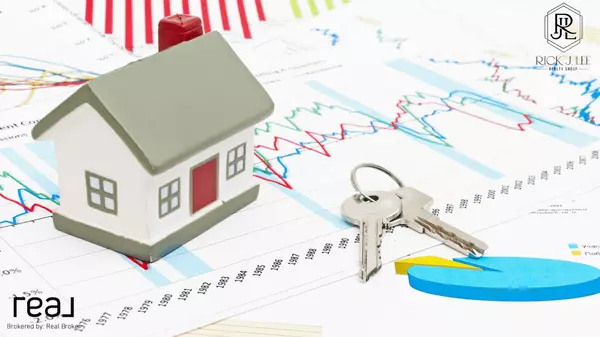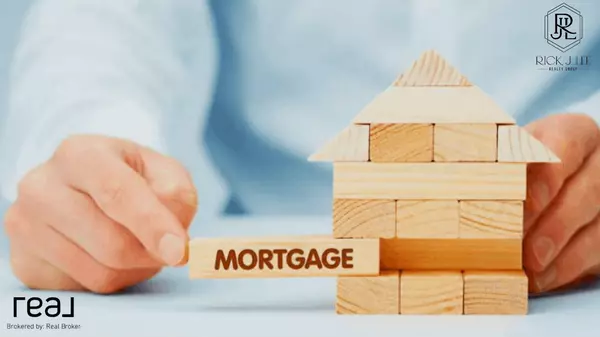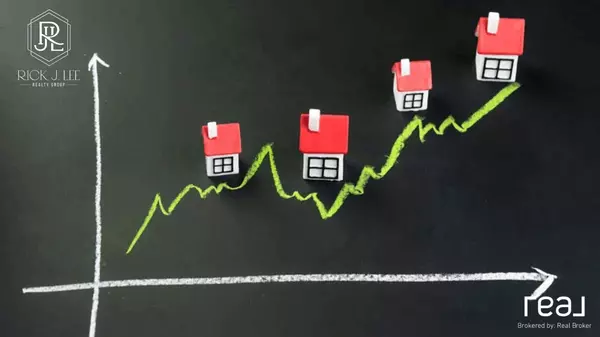
What You Need To Know About Market Stagnation When Pricing Your Home
Understanding Market Stagnation The Ebb and Flow of Real Estate Markets Real estate markets are akin to living organisms, experiencing ebbs and flows dictated by a multitude of factors. These cycles, influenced by economic, social, and environmental forces, can significantly impact property values. Understanding the rhythm of these market fluctuations is akin to reading the pulse of the real estate industry. For sellers, recognizing the signs of a market ebb allows for a proactive approach to pricing strategies, ensuring that your property doesn't get caught in the undertow of a stagnant market. Navigating Economic Turbulence In times of economic turbulence, the real estate market often mirrors the larger financial landscape. Economic downturns can cast a shadow over consumer confidence, making potential buyers more cautious. Sellers need to be astute observers of economic indicators, from employment rates to inflation, to anticipate market stagnation. By staying informed, you can adjust your pricing strategy in response to the larger economic picture, ensuring that your home remains an attractive proposition even in challenging financial climates. The Impact of Regional Development Local development is a key player in the dance of market stagnation. Rapid growth can elevate demand for housing, causing property values to soar. Conversely, stagnation in local development can create a ripple effect, slowing down the real estate market. Sellers must be attuned to both existing and planned developments in their region. This awareness allows for a nuanced approach to pricing, considering not just the current state of affairs but also the trajectory of local growth or stagnation. Pricing Strategies in a Stagnant Market Strategic Pricing for Visibility Strategic pricing is an art that goes beyond mere numbers. It involves a comprehensive analysis of the market, taking into account the unique features and attributes of your property. A Comparative Market Analysis (CMA) becomes a valuable tool in determining a price that is both competitive and reflective of your home's worth. Striking this balance ensures that your property doesn't get lost in a sea of listings, standing out as an attractive proposition for potential buyers. The Psychology of Pricing Pricing isn't just a mathematical equation; it's a psychological game. Understanding the psychology behind buyer behavior allows sellers to influence perception. Utilize pricing strategies that create a sense of value, such as setting a price just below a rounded figure. This subtle manipulation can trigger a positive response in the minds of potential buyers, making your property appear not just affordable but also a smart investment. Timing the Market In real estate, timing is a critical factor. Knowing when to enter the market can be as crucial as determining the right price. Monitoring market trends and recognizing subtle shifts in demand allows sellers to strategically time their listings. Choosing the opportune moment can expedite the selling process, potentially leading to a quicker sale at a favorable price point. Real-Life Success Stories Overcoming Market Stagnation: Jane's Journey Jane's journey through the challenges of market stagnation serves as a beacon of hope for sellers navigating similar waters. Faced with a market slowdown, Jane approached the situation with meticulous research and a flexible mindset. Her decision to price strategically, based on a thorough understanding of local dynamics, not only led to a swift sale but also exceeded her initial expectations. Jane's story underscores the importance of adaptability and informed decision-making in overcoming the hurdles of a stagnant market. Lessons from Tom's Experience Tom, a seasoned seller, shares invaluable insights from his experiences navigating market stagnation. His emphasis on deep market understanding and the ability to adapt pricing strategies showcases the resilience required to thrive in challenging real estate climates. Tom's journey is a testament to the power of knowledge and flexibility, demonstrating that even in stagnant markets, strategic decision-making can lead to successful outcomes. Insider Tips for Sellers Leveraging Technology for Maximum Exposure In the digital age, technology is a seller's greatest ally. High-quality visuals, virtual tours, and a strong online presence can significantly enhance your property's visibility. Embrace the power of social media and online platforms to showcase your home, reaching a broader audience even in the midst of market stagnation. The more exposure your property receives, the higher the likelihood of attracting the right buyer. Building a Stellar Listing Presentation Crafting an irresistible listing presentation is an art that shouldn't be underestimated. Highlighting the unique features of your home, presenting it in the best light possible, and showcasing its potential can captivate potential buyers. A well-crafted presentation not only attracts attention but also communicates the value proposition of your property in a compelling way, setting it apart from other listings in a competitive market. Flexibility in Negotiations Stagnant markets often require sellers to be flexible and open to negotiations. While aiming for the best possible price is natural, being receptive to reasonable offers and considering creative financing options can expedite the selling process. Flexibility in negotiations demonstrates a willingness to collaborate with potential buyers, fostering a positive environment for reaching mutually beneficial agreements even in challenging market conditions. Conclusion In the ever-evolving landscape of real estate, market stagnation is a challenge that demands knowledge, adaptability, and strategic planning. Armed with a deep understanding of market dynamics, effective pricing strategies, and insights from real-life experiences, sellers can navigate through stagnation successfully. Remember, resilience and adaptability are the keys to not only surviving but thriving, ensuring your property stands out even when the market hits a temporary plateau. Follow me on Social Media 👋 Instagram 👉 https://www.instagram.com/rickjleehomes/ 👋 Facebook 👉 https://www.facebook.com/RickJLeehomes 🎥 WATCH NEXT 👉 Subscribe for more Videos: https://www.youtube.com/channel/UCytj... 🔻CONTACT INFO🔻 🏠 WANT TO TALK REAL ESTATE? Fill out this contact form here https://www.rickjleehomes.com/contact 🏠 SEARCH FOR LONG BEACH AND ORANGE COUNTY HOMES FOR SALE https://www.rickjleehomes.com/ 🏠 FREE HOME VALUATION https://www.rickjleehomes.com/evaluation ✔️ CHECK ME OUT ON GOOGLE https://g.page/r/CdWWiyYU6NKIEAE Rick J Lee Rick J Lee Homes Realtor @ ΓEA⅃ Broker DRE # 02130981 📞C:714-943-1598 📧rickjleehomes@gmail.com 🖥RickJLeehomes.com

What you Need to Know About Buying a Home in the Current Market
1. Understanding Market Trends: The Key to Smart Homebuying In the fast-paced world of real estate, staying ahead means understanding market trends. Begin by monitoring interest rates, a fundamental factor that influences the cost of your mortgage. Keep a keen eye on housing inventory – a surplus favors buyers, while a shortage benefits sellers. Additionally, local economic indicators, such as job growth and development plans, can provide valuable insights into the market's trajectory. As you navigate these trends, think of them as your roadmap. Are prices rising? Is demand high? Armed with this knowledge, you're not just making an offer; you're making an informed decision, positioning yourself for success in any market climate. 2. Financing Fundamentals: From Mortgages to Down Payments The financing stage is where dreams meet reality, and understanding the basics is paramount. Dive into the mortgage landscape, weighing the pros and cons of fixed-rate versus adjustable-rate options. Your credit score wields significant influence over your interest rate, so explore strategies to boost it before diving into homeownership. Creative financing solutions and government-backed programs can be a game-changer. From FHA loans to VA loans, these options open doors that might seem closed. This section is your financial toolkit, ensuring that the process of obtaining a mortgage becomes a stepping stone rather than a stumbling block. 3. Location, Location, Location: Finding Your Perfect Spot Your dream home is not just a structure; it's a part of a larger community. Delve into the art of choosing the perfect location. Consider proximity to schools and workplaces, and evaluate the availability of amenities that align with your lifestyle. Dive deep into local crime rates and community vibes – factors that contribute to the overall living experience. Remember, you're not just buying a home; you're investing in a neighborhood. This section acts as your compass, guiding you to that sweet spot that feels like home and offers a promising future. Embrace the excitement of exploring different locales, each one holding the potential to be the backdrop to your life's next chapter. 4. Negotiation Strategies: Getting the Best Bang for Your Buck Negotiation is the heartbeat of real estate transactions, and mastering this art is a game-changer. Begin by understanding the motivations of the seller – are they looking for a quick sale or the highest offer? Craft a compelling offer that not only reflects market value but also appeals to the emotional aspects of the seller. As negotiations progress, be prepared to navigate counteroffers with finesse. Knowing when to stand firm and when to compromise is the mark of a skilled negotiator. This section is your guide to playing the negotiation game strategically, ensuring that you secure the best possible deal on your dream home. 5. Closing the Deal: From Offer Acceptance to Moving Day The journey doesn't end with an accepted offer; in fact, it's just beginning. Dive into the closing process, from inspections to appraisals. Understand the potential hurdles that might arise and equip yourself with the knowledge to overcome them. As the closing date approaches, coordinate with all parties involved to ensure a seamless transition. Moving day is the culmination of your efforts, the moment when the keys to your dream home are finally in your hands. This section prepares you for this triumphant moment, offering guidance on the final steps to transform you from a prospective buyer to a proud homeowner. In conclusion, buying a home in the current market is an intricate dance, requiring a blend of market intelligence, financial savvy, and negotiation skills. With this comprehensive guide, you're not just a buyer; you're a strategic player in the real estate game. Let's embark on this exciting journey, where your dream home awaits as the ultimate prize. Follow me on Social Media 👋 Instagram 👉 https://www.instagram.com/rickjleehomes/ 👋 Facebook 👉 https://www.facebook.com/RickJLeehomes 🎥 WATCH NEXT 👉 Subscribe for more Videos: https://www.youtube.com/channel/UCytj... 🔻CONTACT INFO🔻 🏠 WANT TO TALK REAL ESTATE? Fill out this contact form here https://www.rickjleehomes.com/contact 🏠 SEARCH FOR LONG BEACH AND ORANGE COUNTY HOMES FOR SALE https://www.rickjleehomes.com/ 🏠 FREE HOME VALUATION https://www.rickjleehomes.com/evaluation ✔️ CHECK ME OUT ON GOOGLE https://g.page/r/CdWWiyYU6NKIEAE Rick J Lee Rick J Lee Homes Realtor @ ΓEA⅃ Broker DRE # 02130981 📞C:714-943-1598 📧rickjleehomes@gmail.com 🖥RickJLeehomes.com

7 Ways to Save Money When Buying your Next Home
1. Understanding Your Budget: The Foundation of Financial Success When embarking on your home-buying journey, it all begins with a solid understanding of your budget. Be Realistic: Assess your financial situation objectively, considering not just the purchase price but also additional costs like taxes and closing fees. This step is crucial in preventing financial strain down the road and ensuring you're looking at properties within your means. Prioritize Must-Haves: Clearly define your non-negotiables and nice-to-haves. This not only helps you stay focused during your search but also prevents unnecessary expenditures on features that may not be essential. Pre-Approval Power: Obtaining pre-approval for a mortgage not only streamlines your home search but also gives you a clear budget range. This, in turn, helps narrow down your options, preventing wasted time on properties outside your financial reach. Comparison is Key: Explore different financing options. Rates and terms can vary significantly between lenders, so comparing offers ensures you secure the best deal for your unique circumstances. 2. Mastering the Art of Negotiation: Your Path to Price Reductions Negotiation is an art, and when it comes to home buying, mastering this skill can lead to significant savings. Research is King: Before entering negotiations, thoroughly research the local market and comparable property prices. This knowledge empowers you, allowing you to make informed and strategic offers. Don’t Fear the Counteroffer: A successful negotiation often involves back-and-forth communication. Don't shy away from presenting counteroffers; it's a natural part of the process and can open the door to better deals. Include Contingencies: Building contingencies into your offer provides protection and negotiation flexibility. These could include contingencies related to inspections, financing, or appraisals. Know When to Walk Away: Not every deal is worth pursuing. Knowing when to walk away can save you from potential financial pitfalls. Be willing to let go if the terms aren't in your favor. 3. Timing is Everything: Capitalizing on Market Trends The real estate market is dynamic, and understanding its fluctuations can be a game-changer. Buy in the Off-Season: Consider purchasing during the off-season when demand is lower. Sellers may be more motivated to negotiate, and you could secure a better deal. Follow Interest Rates: Keep an eye on interest rates. When rates are low, it's an opportune time to secure a mortgage, potentially saving you thousands over the life of the loan. Keep an Eye on Housing Inventory: A surplus of homes on the market creates a buyer's market, giving you more negotiating power. Stay informed about local inventory trends to time your purchase strategically. Patience Pays Off: While the excitement of buying a home can be overwhelming, exercising patience can lead to substantial savings. Waiting for the right market conditions or a motivated seller can pay off in the long run. 4. Spotting Hidden Costs: A Closer Look at the Fine Print Hidden costs can turn a great deal into a financial burden. Home Inspection is Non-Negotiable: Invest in a thorough home inspection to uncover potential issues. While this comes with an initial cost, it can save you from significant expenses in the future. Consider Maintenance Costs: Older homes may require more maintenance. Factor potential maintenance costs into your budget, ensuring you're financially prepared for the upkeep of your new property. HOA Fees and Restrictions: Understand the implications of Homeowners Association (HOA) fees. Additionally, be aware of any restrictions they may impose on property use or modifications. These factors can impact your budget and overall satisfaction with the property. Future Resale Value: Before committing, consider the potential resale value of the home. A property with good resale potential can be a wise investment, providing financial security down the line. 5. Utilizing Government Programs: Unveiling Financial Assistance Opportunities Government programs can provide a financial boost to eligible homebuyers. FHA Loans: Federal Housing Administration loans often come with lower down payment requirements, making homeownership more accessible. VA Loans for Veterans: Veterans may qualify for VA loans with favorable terms, including no or low down payment options. First-Time Homebuyer Programs: Many regions offer programs specifically designed to assist first-time homebuyers. These programs may include down payment assistance or favorable loan terms. Tax Credits and Deductions: Explore available tax credits and deductions related to homebuying. These incentives can contribute to significant savings over time, making homeownership more affordable. 6. DIY and Sweat Equity: Adding Value While Cutting Costs Taking a hands-on approach can enhance your home's value without breaking the bank. Learn Basic DIY Skills: Acquiring basic do-it-yourself skills can save you money on minor repairs and improvements. Simple tasks like painting, caulking, or fixing minor plumbing issues can be tackled with a little effort. Upcycling and Repurposing: Give new life to existing items or materials. Upcycling and repurposing can be a creative and cost-effective way to furnish and decorate your home. Landscaping on a Budget: Curb appeal matters, but landscaping costs can add up. Opt for cost-effective landscaping options, and consider tackling some tasks yourself to save on professional services. Sweat Equity in Renovations: Invest your time and effort into renovations to reduce labor costs. Whether it's painting, tiling, or minor construction, your sweat equity can add significant value to your home. 7. Financial Planning for the Long Haul: Ensuring Lasting Affordability Securing your financial future involves more than just the initial purchase. Emergency Fund for Homeownership: Establish and maintain an emergency fund specifically designated for homeownership. This fund can cover unexpected repairs or serve as a financial safety net during economic uncertainties. Refinancing Opportunities: Keep an eye on interest rates even after purchasing your home. If rates drop significantly, explore the possibility of refinancing to lower your monthly mortgage payments. Invest Wisely: Understand the impact of your home purchase on your overall financial portfolio. Ensure your investment aligns with your long-term financial goals and contributes positively to your net worth. Plan for Appreciation: Consider the potential for your home's value to appreciate over time. Factors like neighborhood development and market trends can positively impact your property's value, providing a potential source of future financial gain. By adopting these strategies, you're not just buying a home; you're securing your financial well-being. Remember, the key is a balance between finding your dream home and ensuring it fits within your financial comfort zone. Happy house hunting! Follow me on Social Media 👋 Instagram 👉 https://www.instagram.com/rickjleehomes/ 👋 Facebook 👉 https://www.facebook.com/RickJLeehomes 🎥 WATCH NEXT 👉 Subscribe for more Videos: https://www.youtube.com/channel/UCytj... 🔻CONTACT INFO🔻 🏠 WANT TO TALK REAL ESTATE? Fill out this contact form here https://www.rickjleehomes.com/contact 🏠 SEARCH FOR LONG BEACH AND ORANGE COUNTY HOMES FOR SALE https://www.rickjleehomes.com/ 🏠 FREE HOME VALUATION https://www.rickjleehomes.com/evaluation ✔️ CHECK ME OUT ON GOOGLE https://g.page/r/CdWWiyYU6NKIEAE Rick J Lee Rick J Lee Homes Realtor @ ΓEA⅃ Broker DRE # 02130981 📞C:714-943-1598 📧rickjleehomes@gmail.com 🖥RickJLeehomes.com
Categories
- All Blogs (167)
- Aliso Viejo, California (2)
- Anaheim, Calfornia (3)
- Beach House (2)
- Best places for surfers (1)
- Bixby Knolls (1)
- Buena Park, California (2)
- Buying and Selling Real Estate (28)
- California (2)
- California Beach House (2)
- Cerritos, California (1)
- Costa Mesa, California (1)
- Current Market (1)
- Cypress, CA (4)
- Dana Point, California (1)
- Downey, California (1)
- Equestrian (1)
- Fountain Valley, California (5)
- FSBO (1)
- Fullerton, California (1)
- Fur Parents (1)
- Garden Grove California (6)
- History (2)
- Holiday in Long Beach (1)
- home (12)
- Home Improvement (1)
- home value (7)
- Huntington Beach (5)
- Irvine, California (3)
- La Habra, California (1)
- Laguna Niguel, California (1)
- Lake Forest, California (1)
- Lakewood Event (1)
- Lakewood, California (15)
- Lifestyle (1)
- Listing (1)
- Long Beach Events (1)
- Long Beach Neighborhood (1)
- Long Beach, California (19)
- Los Alamitos (1)
- Los Alamitos, California (1)
- Market Reports (7)
- Mission Viejo, California (1)
- Mortgage Lender (1)
- Moving to Aliso Viejo, California (2)
- Moving to Anaheim, California (3)
- Moving to Buena Park, California (2)
- Moving to California (11)
- Moving to Cerritos, California (1)
- Moving to Costa Mesa, California (1)
- Moving to Cypress, CA (3)
- Moving to Dana Point, California (1)
- Moving to Downey, California (1)
- Moving to Fountain Valley, California (4)
- Moving to Fullterton, California (1)
- Moving to Garden Grove, California (5)
- Moving to Huntington Beach (5)
- Moving to Irvine, California (3)
- Moving to Lakewood (2)
- Moving to Lakewood, California (4)
- moving to Long Beach, California (12)
- Moving to Los Alamitos, California (1)
- Moving to Los Angeles (1)
- Moving to Mission Viejo, California (1)
- Moving to Newport, California (3)
- Moving to Orange County, California (20)
- Moving to Orange, California (1)
- Moving to Placentia, California (1)
- Moving to Rossmoor, California (1)
- Moving to San Clemente, California (2)
- Moving to Seal Beach, California (2)
- Moving to Signal Hill, California (2)
- Moving to Stanton, California (1)
- Moving to Tustin, California (2)
- Moving to Westminster, California (2)
- Newport Beach, California (3)
- Orange County, California (8)
- Orange, California (2)
- Placentia, California (1)
- Real Estate (34)
- Real Estate Agent (25)
- Rossmoor, California (1)
- San Clemente, California (2)
- San Juan Capistrano, California (1)
- Saving Money (1)
- Seal Beach, California (3)
- Signal Hill, California (3)
- Social Media (1)
- Stagnation (1)
- Stanton, California (1)
- Success Story (1)
- surfing (1)
- Tips in Moving (1)
- Tustin, California (3)
- Westminster, California (2)
Recent Posts











